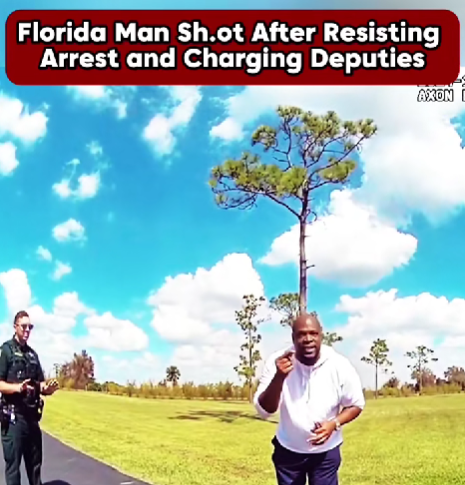A tense confrontation between a Florida man and sheriff’s deputies ended in tragedy last week, reigniting national conversations about de-escalation, mental health, and the dangers faced by both law enforcement officers and citizens during high-stress encounters.
According to the sheriff’s office, deputies responded to reports of a disturbance in a quiet suburban neighborhood after multiple 911 calls described a man acting erratically in the middle of a roadway. When officers arrived, they found the individual visibly agitated and shouting incoherently.
Bodycam footage, later released to the public, shows deputies trying to calm him down, maintaining distance and using measured tones to defuse the situation. “We just want to talk,” one officer can be heard saying. But as the minutes passed, the tension built. The man refused repeated commands to stand down, his emotions clearly spiraling out of control.
What happened next unfolded in seconds. As the man suddenly advanced toward deputies, they were forced to make a split-second decision. Shots were fired, and the man fell to the ground. Despite immediate medical aid, he did not survive.
The sheriff’s department described the incident as “a heartbreaking and dangerous situation that no one wanted to see happen.” Officials emphasized that the deputies followed protocol and are now on administrative leave pending a full investigation — a standard procedure after any use of force.
“This was a tragedy for everyone involved,” said Sheriff Rick Morales during a press briefing. “Our hearts go out to the family of the individual, as well as to the deputies who now have to live with the weight of that moment.”
The video quickly spread online, sparking intense discussion about how such encounters can escalate so quickly — and whether more can be done to prevent them.
Advocates for police reform argue that the incident underscores the need for greater investment in mental health crisis units and non-lethal intervention training. “When someone’s in emotional distress, they’re not thinking logically,” explains crisis negotiator Dr. Helena Cruz. “If we can reach them before adrenaline takes over, we can save lives on both sides.”
Supporters of law enforcement, meanwhile, stress the unpredictability and danger officers face daily. “They had seconds to decide,” one commenter wrote. “You can’t armchair quarterback a life-or-death situation.”
Regardless of perspective, both sides agree on one thing: the tragedy should serve as a lesson — about empathy, communication, and preparation.
The sheriff’s office has since announced plans to review its crisis-response protocols and expand its use of specialized training programs that teach officers how to handle volatile encounters more safely.
“This is not about blame,” Sheriff Morales added. “It’s about learning how to keep everyone — officers and citizens alike — alive.”
The story remains under investigation, but its message echoes beyond Florida: every confrontation is a chance to de-escalate before tragedy strikes.
